On a bright spring day in 2009, Trevor Immelman found himself hitting balls next to Tiger Woods on the practice range at Augusta National Golf Club.
It was Tuesday, and Immelman, the Masters defending champion, had a big day ahead of him, but in that moment, he was just trying to loosen up before an 18-hole practice round. At one point, Woods turned to Immelman and asked him, “Hey, what time does everything start tonight?”
The young South African was confused. Woods was referring to the start of the annual Champions dinner. As a four-time winner of the Masters—he of course added a fifth title in 2019—Tiger knew full well when the exclusive affair reserved strictly for winners of the green jacket was set to begin. Immelman froze in his place. He was to be the guest of honor and the host that night at a dinner attended by upwards of 30 former champions, an occasion that is one of the grandest Masters traditions.
“I was thinking, ‘How does he not know when the dinner starts?’ And now I’m questioning when it starts,” Immelman recalled. “Then I started thinking about my speech. And the menu. I’m getting more nervous by the minute. Look, there’s no ‘Champions Dinner for Dummies’ book out there. I was a wreck the rest of the day. Tiger was messing with me.”
This Tuesday on the second floor of the stately white clubhouse at Augusta National, a contingent of young and old and wise Masters champions will reconvene for another edition of golf’s most exclusive dinner party. Scottie Scheffler, winner by three strokes a year ago, will be the man of the hour—and on the hot seat, if you will—feted for his accomplishment with Woods and Immelman, legends Jack Nicklaus, Tom Watson and Gary Player, and current peers like fellow Texan Jordan Spieth seated before him at one large table. They all will dine on the menu Scheffler has chosen and then they will lend an ear to his prepared remarks. And then stories will flow, laughter will fill the tight quarters, and Scheffler will understand the fraternity to which he has been welcomed—a fraternity furiously, passionately coveted among the uninitiated.
“If there is anything in our sport, and sports in general, that defines class and grace, it’s the Masters,” said Zach Johnson, who won the 2007 Masters. “And at the top of that experience is the opportunity to go sit at that table on Tuesday nights. I can’t ever imagine missing one.”
While the illustriously cloistered affair is commonly known as the Champions dinner, its proper name is the Masters Club dinner. Ben Hogan started the Masters Club in 1952, the year after the first of his two victories at Augusta National.
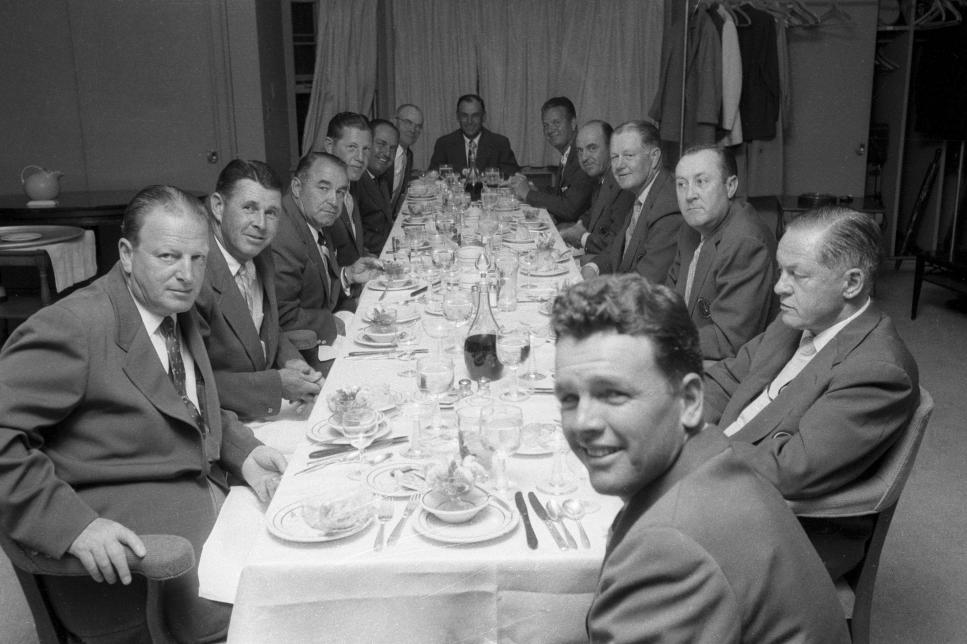
Clockwise from bottom left: Craig Wood, Henry Pickard, Gene Sarazen, Norton Smith, Claude Harmon, Augusta National chairman Cliff Roberts, Ben Hogan, Jimmy Demaret, Sam Snead, Byron Nelson, Herman Keiser, Bobby Jones, and Jack Burke, Jr. seated around the table during 1957 Champions Dinner on Tuesday at Augusta National.
The green jacket, which first was presented in 1949 to winner Sam Snead, is the outward symbol of achievement for Masters champions. The notably taciturn Hogan, who finally triumphed at Augusta National in his 10th attempt, believed that the bond among Masters winners should be celebrated in a private interpersonal manner, so he organized the first “stag” dinner the year after his two-stroke victory over Skee Riegel in ’51. He invited the 10 other men who had won the tournament as well as co-founders Bobby Jones and Clifford Roberts, who were made honorary members of the club. (Each succeeding chairman of Augusta National also is bestowed an honorary membership.)
“Bubba actually is great to sit next to because he’s a picky eater, and you can pick off his plate.”
Zach Johnson
Hogan intended for the dinner to be informal, once saying, “it would be pleasant for all past winners to gather to reminisce, swap banter and relax.”
Hogan also commissioned the creation of a gold locket to present to each winner. The three-piece locket, measuring 1½ inches by 1 inch, is formed in the shape of the Augusta National Golf Club logo. Inside is a silhouette of the clubhouse and the champion’s name. On another side, it reads, “Ben Hogan, founder of the Masters Club.” Ben Crenshaw once described it as “the most beautiful thing you’ve ever seen.”Six-time champion Jack Nicklaus said Hogan handed his locket to him personally in 1964, and he considers it among his most prized keepsakes. “I still remember when he gave it to me, and what it meant to me that I received it from him,” said Nicklaus, who had grown close to Hogan after they played the final 36 holes together in the 1960 U.S. Open at Cherry Hills.
Tom Watson, winner in 1977 and ’81, couldn’t have known that he’d be the last champion to receive his locket from Bantam Ben when Hogan made his final appearance at the dinner in 1978. The significance is not lost on him. “I was pretty overwhelmed,” Watson recalled. “Considering that he never came back, that’s just how it worked out, but, yeah, I’m the last link in that particular chain to Hogan, you could say.”
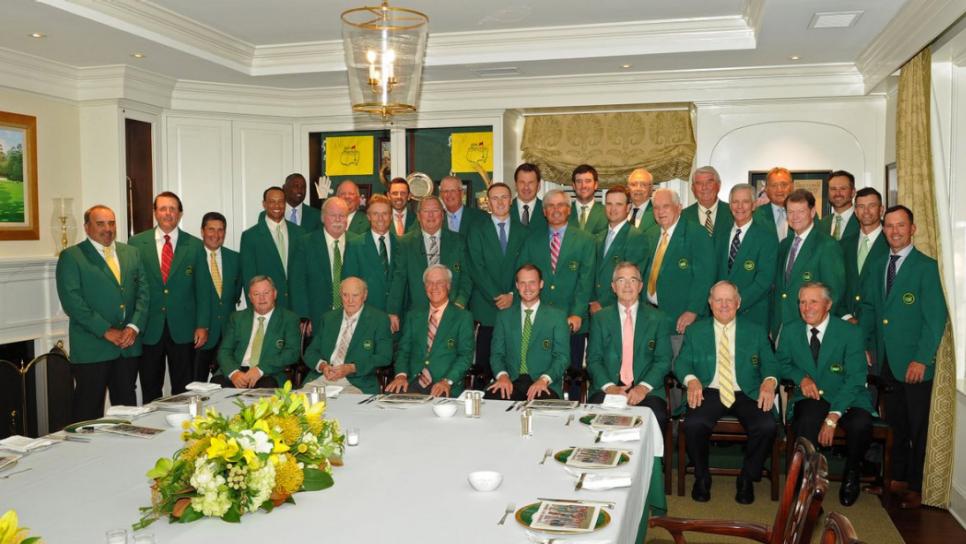
The first Masters Club dinner was scheduled for 7:15 p.m. Friday, April 4, after the second round of what was the 15th Masters. (It was moved to Tuesday in 1959.) Hogan’s invitation had but one stipulation, that attendees wear their “green coats.” These days, all the attendees complement their green jackets with ties, but in 1952 the players adhered to Hogan’s suggestion and the spirit of the occasion by wearing jackets and open-collared shirts. Jones and Roberts, however, stood on ceremony and wore ties.
Players in attendance were Hogan, Snead, Byron Nelson, Gene Sarazen, Claude Harmon, Jimmy Demaret, Henry Picard, Horton Smith and Craig Wood. Absent were Ralph Guldahl and Herman Keiser, who did not compete that year.
Hogan picked up the tab, establishing the precedent that the champion is responsible for settling affairs at the conclusion of the evening. He presided over the first four dinners and then abdicated the role of emcee to his unassuming fellow Texan, Nelson, who then passed the baton in 2005 to the preternaturally congenial Ben Crenshaw, another Texan. Oddly, Hogan stopped attending in 1968, returned for one year in ’72 and then never showed up again after ’78, claiming that the demands from his eponymous equipment company had become overwhelming. However, a prevailing theory suggested that Hogan found the occasion less appealing after Texas peers Demaret and Jack Burke, Jr., had become perennial no-shows.
“Sam (Snead) killed more dinners telling the dirtiest damn jokes you could ever hear. We’d be like, ‘We can all leave. We can’t do better than that.’”
Fuzzy Zoeller
(Crenshaw and Charles Coody are making a push to convince Burke to return this year after he celebrated his 100th birthday Jan. 29.)
Whatever the case, Hogan gifted to future Masters champions a dinner party that is arguably the highlight of the year for many, if not all, those privileged to attend. Other than 2020, when the Masters was pushed into November because of the pandemic and some older champions remained home because of health concerns, it’s a rare occurrence when any able-bodied past champion purposely sends his regrets (the dinners in 2020 and 2021 were also the only ones to be held in the more spacious Trophy Room as opposed to upstairs in the clubhouse).
In 1999, after hip replacement surgery, Nicklaus missed his first Masters start in 40 years, but he limped his way into the dinner. Despite his myriad injuries in recent years, Tiger Woods attended all but the 2021 dinner hosted by Dustin Johnson, which was held just two months after Woods’ horrific auto accident in California. Woods tweeted on April 6 that year, “I’ll miss running up @DJohnsonPGA’s bill at the Champions Dinner tonight. It’s still one of my favorite nights of the year.” Arnold Palmer was too frail to hit the opening tee shot in the 2016 Masters, but the words he spoke at what would be his last dinner rendered the evening one of the most emotional anyone could remember.
Larry Mize, one of two players, along with Sandy Lyle, who will compete in his final Masters next week, said he will keep attending, “even if they have to carry me up the stairs one day.”
The official Masters Club dinner invitation informs that cocktails begin at 6:30 p.m. and dinner at 7 but neither time is accurate. Many fellows show up as early as 6 o’clock. “We’ve gotta have time for the popsicles,” Fuzzy Zoeller said wryly.
Drinks are served in the Champions’ Locker Room and hors d’oeuvres are served on the balcony at what is the front of the clubhouse. Around 7 o’clock, the club manager will announce that it is time to assemble for dinner. Actually, however, it is time for the group photo, which has a herding-of-cats efficiency to it as the men make their way to the back of the clubhouse. Best-case scenario is that everyone has found a chair by 7:15, following certain unspoken protocols. There are no assigned seats except at the head of the table, which is reserved for the defending champion/host, in this case Scheffler, seated between Crenshaw and Masters chairman Fred Ridley.
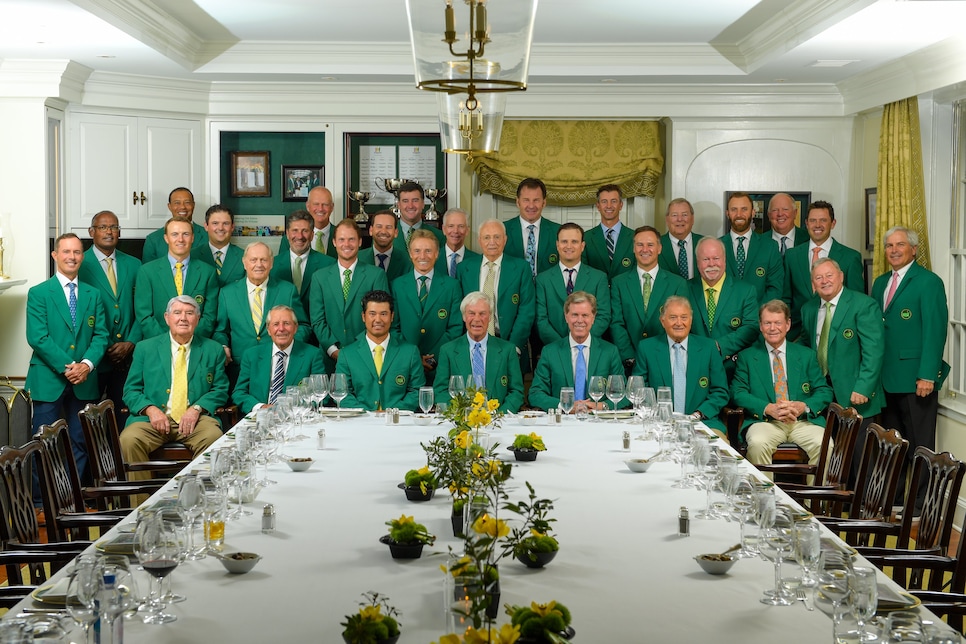
The 2022 Champions Dinner
The remaining contingent fan out to familiar general locations along the large rectangular table that stretches some 40 feet, though it is common practice to allow the more senior champions to sit first. “We sort of have our regions of the table,” said Johnson, who won in 2007. “We might not all be exactly in the same seats, but it doesn’t vary that much, either.”
Indeed, Johnson traditionally will have Jordan Spieth seated immediately on his right and Mize, Bernhard Langer, Bubba Watson, Dustin Johnson and Patrick Reed somewhere in the vicinity. “Bubba actually is great to sit next to,” Zach said, “because he’s a picky eater, and you can pick off his plate.”
Watson owns it. “I’ll give you a secret,” he said at the LIV event in Tucson. “Normally I eat before, eat a couple burritos before I go to the dinner because I don’t know what they’re going to have.”
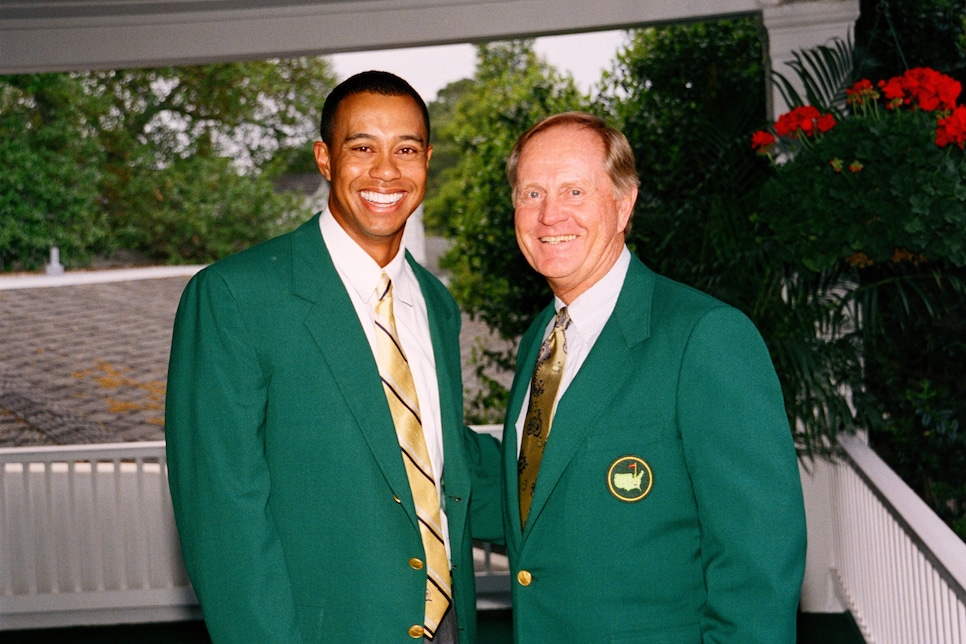
Augusta National
On the opposite side, to the left of the head table, Nicklaus regularly plops himself in the middle. In years past, that was next to Palmer. Watson is on one side most years now, Woods on the other. Couples and Floyd are nearby while Mark O’Meara flanks Tiger. Farther down and around the corner are Adam Scott, Immelman, Sir Nick Faldo and Player. Phil Mickelson tends to shade towards the front.
Zoeller and Vijay Singh hang out in the back. “Fuzzy is too loud to be anywhere near the front,” said Coody, who also prefers the back of the room with other “reprobates,” a group, he said, that used to include Snead and Billy Casper.
“I was always camped out with the old guys,” said Zoeller, the 1979 winner and the last of three men to win a green jacket in his debut. “Just a bunch of grumpy old men sitting around telling war stories. I loved it. For a lot of years I sat next to Herman Keiser. His grandson would come to me and tell me, ‘I want you to take care of Papa.’ And I would take care of him. But one year, Hermie got started early on the sauce, and he got away from me. I was like, ‘Where in the hell did he go?’ I found him in the bathroom dead asleep.”
Around 8, Crenshaw stands and brings the room to order. He begins by talking about the tournament, perhaps citing a few statistics or little-known facts, and he might recognize a few anniversaries. Scott, for instance, won the Masters 10 years ago, Mike Weir 20 (beating Phil Mickelson as the first lefty champion) and Mark O’Meara 25 years ago. Oh, and Nicklaus celebrates his 60th anniversary since his first green jacket.
The chairman is introduced next to say a few words. There’s a better than average chance Ridley might offer an observation, among other things, on changes to the par-5 13th hole. Then it’s the champion’s turn to speak, after which the floor is open. Claude Harmon knew how to bust up a room, and Bob Goalby was a captivating raconteur. Scott said that Fred Couples, “does a great job needling some of the older players into telling stories. He’s a very good facilitator.” Last year, Watson opened by sharing the details of Doug Ford’s three-stroke victory over Snead in 1957, capped by holing out from the left greenside bunker on the 72nd hole.
No topic is off limits. Well, almost.
“There was one year when the chairman invited us to let him know if there was anything about the golf course they could do better,” said two-time winner Bernhard Langer. “Arnold Palmer stood up and said, ‘Mr. Chairman [Hord Hardin], half of the fairways are mowed with us, and half of the fairways are mowed into us.’ Which, of course, keeps the ball from rolling. And then Arnold said, ‘We’re good, but we’re not that good that we can always hit the half of the fairway that is down grain.’ The next day they mowed the whole thing into us.”
The evening invariably ends around 9. Right up to his last dinner in 2002, about a month before he died, Snead took it upon himself to bring down the curtain on things with a brand of Virginia humor that veered between off-color and off-putting. Perhaps the rarest event at Augusta National is finding someone who would dare repeat one of his jokes.
“Sam killed more dinners telling the dirtiest damn jokes you could ever hear,” Fuzzy Zoeller said. “We’d be like, ‘We can all leave. We can’t do better than that.’”
“Byron would have to stand up and cut him off. ‘OK, Sam, that’s enough,’” Crenshaw said. “Those stories were rough.”
“Cliff Roberts would just sit there and try not to laugh. Which made us laugh even more,” Coody said. “Finally, he’d just snicker a little. He didn’t want to break that gruff exterior.”
There are legitimately just three responsibilities the defending champion must fulfill—and one of them is completed weeks in advance with the selection of his personalized menu. The other two are gab and tab. He is obliged to stand and give a short speech, and at the end of the night he’s responsible for paying the bill.
It wasn’t until 1986 that the champion could offer alternatives to the standard Augusta National dinner menu that featured three entrees: beef, chicken or fish. “They told me I could have whatever I wanted, which surprised me a little,” said Langer, the ’85 champion, who chose wedding soup, sauerbraten with spätzle, red cabbage and his favorite dessert, Black Forest cake. In 1994, he went with a simpler option: turkey with dressing.
The club cooks fulfill the orders, including haggis for Sandy Lyle in 1989. The one exception was 2001, when Fiji-born Vijay Singh brought in chefs from Atlanta to prepare the Thai-infused offerings he requested.
The champion’s speech doesn’t necessarily have to be memorable, Crenshaw said, “as long as it’s from the heart.”
Nevertheless, “there’s a lot of choking going on,” Coody said. “That’s a tough room to stand up in front of.”
Watson thought he was prepared. Then he looked around the room. “I’m looking in the eyes of Gene Sarazen and Henry Picard, Claude Harmon, Byron Nelson, Sam Snead, Ben Hogan … and that when it hits you where you are and the legacy that you’re a part of now.”
“Hell, yeah, you’re nervous,” said Zoeller, who took the unique step of bringing gag gifts to calm his nerves. A graying Palmer laughed when Zoeller handed him a bottle of Grecian Formula. “You’re not sure what to expect and you’ve got all your heroes in the room looking at you. That is intimidating.”
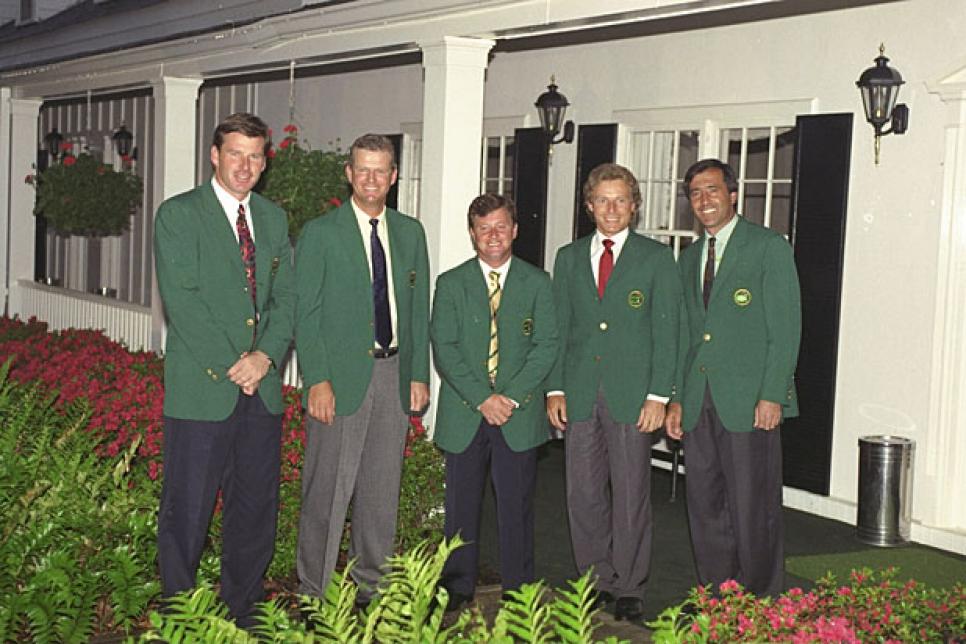
Stephen Munday/Getty Images
Perhaps the only thing more nerve-racking for the host is being presented the check after handshakes and bro hugs. Membership has its privileges, but it also has its sticker shock. In 1977, Ray Floyd’s bill came to a reported $450. In 2008, Zach Johnson remembers the night costing him close to $10,000. Tiger wasn’t kidding when he joked about missing the chance to run up Dustin Johnson’s tab.
“I got through the speech fine,” 2016 winner Danny Willett said grinning only slightly, “because that part I could control.”
“Adam and I always like to try and run up the bill by having an expensive bourbon, something ridiculously obnoxious like a 23-year-old Pappy or a Weller,” Immelman confessed. “We basically just say whatever the most expensive thing you have back there, we’ll have some, just to make sure that this guy [the champion] feels it at the end. It happened to us. As traditions go, that’s a good one.”
Ben Crenshaw has told the story several times, how Byron Nelson phoned him in early 2005 and asked him to take over the dinner on his behalf and how Crenshaw proceeded to drop the phone. Of course, Nelson, nearing his 93rd birthday and four years removed from ending his role as an honorary starter, chose him because he knew Crenshaw wouldn’t drop the ball.
“He said, ‘Ben I just can’t go over there anymore. My body won’t let me do it. Please take my place. I know you’ll do great.’ It was such an honor for Mr. Nelson to think of me that way,” Crenshaw said. “I wasn’t sure I was ready. He told me, ‘Keep it light and keep it moving. Honor the champion. You’ll know what to say.’”
Crenshaw has been thinking of Lord Byron’s words a lot in recent weeks because what he says next week takes on greater importance.
It’s no secret that the fracture in professional golf will put players from the rival LIV Golf League in close proximity to their former PGA Tour peers for an extended period. Some harsh words have been exchanged since LIV launched in June. Positions have hardened. Lawsuits are pending. Things could get interesting when the six LIV golfers who own green jackets—Reed, Dustin Johnson, Phil Mickelson, Bubba Watson, Sergio Garcia and Charl Schwartzel—start rubbing elbows, literally, in the tight dining quarters.
In January at the Sentry Tournament of Champions, Jon Rahm wasted little time expressing his curiosity about the impending dynamics at the dinner three months later. “I keep thinking about it,” he said, “because I wish I could be there and just be able to see how things work out.”
Chances are, while some nervous tension might permeate the atmosphere, everyone will carry on as before and preserve the convivial nature of the affair. “I think it’s going to be great,” Bubba Watson said. “I can’t wait to get there because when you’re wearing the green jacket at the dinner, everything goes out the window.”
“That’s the hope,” Immelman said, “though I’d be lying if I said some of us haven’t talked about it a little with some worry.”
“You just hope someone doesn’t say the wrong thing or there’s some kind of misunderstanding,” Coody said.
Crenshaw feels that his job is to ensure nothing of the sort occurs. He said he might consider making a few brief remarks well before his traditional time to talk. “I have always tried to carry on with a lot of humility. I don’t want to assume anything,” he said. “I don’t know what’s going to happen. I’m just going to make the point—though maybe I won’t need to make it—that we’re all champions of this great tournament and each person belongs in that room, and we should all celebrate that and celebrate Scottie Scheffler.
“I’m just glad that it’s Ben up there running things,” Zach Johnson said. “There’s a way to approach it, and I’m extremely confident that whatever Ben chooses to say is going to be an appropriate, classy way of doing it. I think it’ll be fine. It’s bigger than any of us, and I think when we all are in there together, we’ll all remember that.”
The spirit of the Masters Club endures at Augusta as profoundly as the memory of Bobby Jones. That is how Hogan envisioned it.
In 1954, Hogan penned a letter to Jones and Roberts reinforcing his feelings about the tradition he had created. “This has to be the most exclusive club of all,” he wrote. “Not only do a fortunate few of us have the tournament to look forward to, but the annual meeting of our club as well. Here, long after serious competition for some of us comes to an end, we can still get together and reminisce.”
Scott recently pondered his future participation in the Masters, promising to compete as long as possible, longer than perhaps he should. Then he seemed to echo Hogan’s sentiments, seeing beyond his playing days, saying, “I’ll look forward to going to the dinner forever.”
Winning the Masters brings many rewards, but attending the Masters Club dinner might be the most intrinsically meaningful. However far removed each man is from his respective success, he gets to bask in the glow of his triumph as part of golf’s most cherished brotherhood. Through that prism, the memories become amplified, shared nostalgia stirring an elixir of renewal. Something happens at that dinner; it’s a feast of fulfillment.
“I can’t really explain it, but the night is just magical,” Immelman said.
Tom Watson agrees. That is the essence of the Masters Club dinner. “I think of that older generation when I first won … to have that chance once a year to meet up with those men and to feel included in their world of a different time and generation, to hear their stories, you were living for a few hours in the ultimate time machine,” he said.
“I don’t know what’s going to happen. I’m just going to make the point that we’re all champions of this great tournament and each person belongs in that room.”
Ben Crenshaw on this year’s awkward dynamic
“Last year I got Jack talking about his last nine holes in ’86, and you could see the younger guys hanging on every word. When we talk about how we won the Masters, whoever that is, how we felt, how our life was at the time, what we were thinking … that passes on the history of the game,” Watson added. “And I really hope that what I started last year catches on where someone talks about another Masters champion and how he won it. That keeps all Masters winners alive.”
“When you think of the players there now and who have been there in the past,” Crenshaw added, “and you’re sort of looking through the passage of time at a cavalcade of champions. I think the occasion speaks to all of us in a deeply personal way like nothing else that any of us have ever experienced in the game of golf.”




